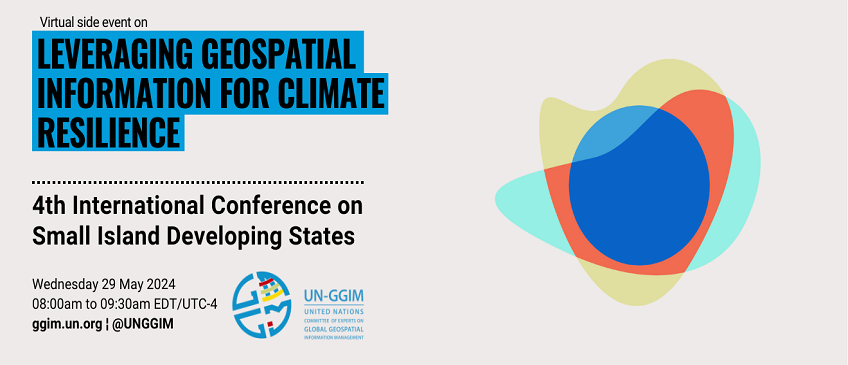Geospatial information provides key insights, and policymakers leverage it to make evidence-based decisions. Geospatial information reflects the digital version of our physical world, in which all human, economic and environmental activity and events take place. Geospatial data is a vital component of the overall information and management systems related to the Earth and human activities, enabling us to not only map the current situation on Earth, but also the modelling of nature's processes. By understanding natural and built environments, stakeholders tackle complex challenges and bolster resilience, sustainability, and societal equity. Our changing climate is increasing the fragility of the most vulnerable countries, making adaptation and mitigation even more challenging, leaving those that are already the furthest behind in terms of development further behind still. Although strengthening climate resilience is essential for all countries, it is especially crucial for SIDS, hampered by their unique vulnerability to exogenous shocks because of their small size, geographical remoteness, and the limited scale and undiversified nature of their economies.
Thus, on the margins of the 4th International Conference on Small Island Developing States, UN-GGIM's Task Team on Geospatial Information for Climate Resilience convened the virtual side event 'Leveraging geospatial information for climate resilience'. Anchored by three high-level contributions by HE Ambassador Francois Jackman (Permanent Representative of Barbados to the UN), HE Ambassador Elizabeth Thomson (Barbados Ambassador Extraordinary & Plenipotentiary with Responsibility for Climate Change, Small Island Developing States and Law of the Sea), and Ms Rebecca Fabrizi, SIDS Envoy, United Kingdom, the side event helped build awareness of the many innovative applications of geospatial information for climate resilience. Moreover, the side event helped showcase the forthcoming UN-GGIM discussion paper 'Applying Geospatial Information to Climate Challenges' and also shared examples of the use of geospatial information for climate resilience in SIDS in Singapore and the Caribbean. In particular, participants at the side event were informed of the following:
- High-level statements and perspectives on the importance of geospatial information for climate resilience by global leaders from Member States.
- How Member States are leveraging geospatial information for climate resilience
- Highlighting national good practices of integrated geospatial information management in SIDS
The recording of the event is here: https://youtu.be/xdwTmlwXgxg
Annual sessions
- Fifteenth session
- Fourteenth session
- Thirteenth session
- Twelfth session
- Eleventh session
- Past sessions

